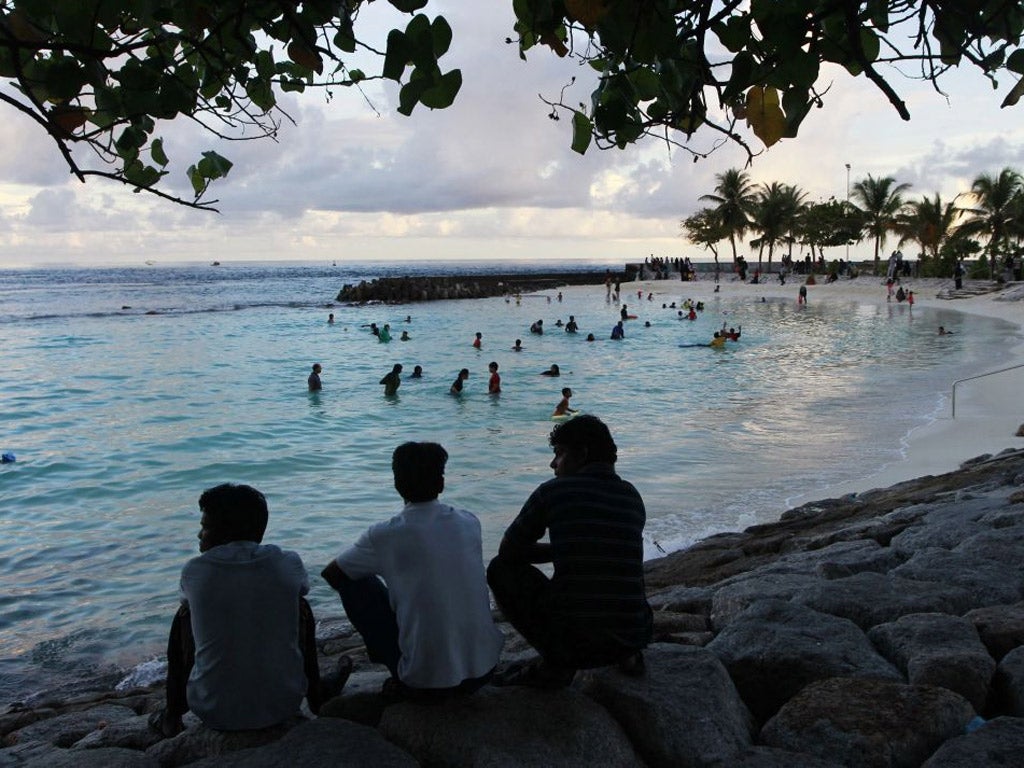Ahmed Rilwan's disappearance is a perfect illustration of the Maldives’ ongoing troubles
There is a darker, more menacing side to the island nation that the foreign tourists rarely see


The last believed sighting of Ahmed Rilwan – and even that is not confirmed – took place a month ago and occurred in deeply ominous circumstances.
The Maldivian journalist was heading home in the early hours of 8 August, using the ferry that connects Male to Hulamale. He was captured on CCTV shortly before 1am. He was wearing a dark shirt.
At around 2am, witnesses reported seeing a man in dark clothes being forced at knifepoint into a vehicle parked outside Mr Rilwan’s apartment. There has been no word of the 28-year-old since. Mr Rilwan, who used the Twitter handle Moyameehaa, wrote about politics, criminal gangs, Islamic extremism and the not uncommon nexus of all three. He upset people and received threats from those who wanted him to stop. He chose to carry on. “We believe he was abducted but we’ve not got any leads,” said his brother, Moosa Rilwan. “We believe he was abducted by people to stop his freedom of speech; to stop him writing about politics and radicals.”
Asked if he believed his brother was still alive, he replied: “We hope he is still alive; [we] are trying our best to find him.”
The Maldives, an island nation made up of more than 1,200 atolls, is best known as a location of picture-perfect beaches and a destination for luxury holidays. Tourism accounts for at least 30 per cent of GDP and in 2013 there were 82,690 visitors from the UK. China and other parts of east Asia account for an increasing number of visitors. But there is a darker, more menacing side to the Maldives that the foreign tourists rarely see. For decades, the nation was run by a military dictator, Maumoon Abdul Gayoom, who in 2008 was beaten in the first open election by former political prisoner, Mohamed Nasheed.
Mr Nasheed was forced out of office in early 2012 in what he termed a coup and the country was plagued with political turmoil for more than 18 months. The current president, Abdulla Yameen, a half-brother of Mr Gayoom, was elected in November 2013. Activists say the Maldives, a Muslim nation, faces challenges on many fronts, including the seeping influence of Wahhabism, corruption and challenges to press freedom. A report published earlier this year by the Maldives Broadcasting Commission found 84 per cent of journalists said they had been threatened. In 2012, a well-known journalist and human rights campaigner, Ismail Rasheed, was stabbed in the throat outside his home. He survived narrowly. Then a television journalist was severely beaten in February 2013. “We are extremely worried by Rilwan’s disappearance and urge the authorities to step up their efforts to find him as quickly as possible,” said Christophe Deloire, of Reporters Without Borders.
The Human Rights Commission of the Maldives has said the authorities are not doing enough. The UN has also spoken out about Mr Rilwan’s disappearance.
Maldives Police said a special team was examining CCTV footage and divers have searched the harbour, adding: “It is a highly prioritised case.” The office of President Yameen failed to respond to questions.
Mr Rilwan was employed by Minivan News, which during the years of turmoil has continued to pursue independent journalism. Along with the journalist’s family, it has organised a petition calling for more action.
Its editor, Daniel Bosley, said there had been no update but that there was little alternative but to wait.
“It remains a mystery,” he said. “[Ahmed] doesn’t appear any closer to being found.”
Join our commenting forum
Join thought-provoking conversations, follow other Independent readers and see their replies
Comments
Bookmark popover
Removed from bookmarks